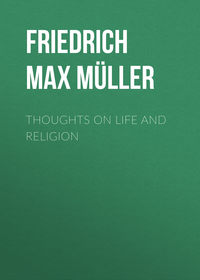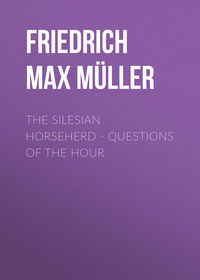
Полная версия
Chips from a German Workshop, Volume 1
The thoughtful bent of the Hindu mind is visible in the Veda also, but his mystic tendencies are not yet so fully developed. Of philosophy we find but little, and what we find is still in its germ. The active side of life is more prominent, and we meet occasionally with wars of kings, with rivalries of ministers, with triumphs and defeats, with war-songs and imprecations. Moral sentiments and worldly wisdom are not yet absorbed by phantastic intuitions. Still the child betrays the passions of the man, and there are hymns, though few in number, in the Veda, so full of thought and speculation that at this early period no poet in any other nation could have conceived them. I give but one specimen, the 129th hymn of the tenth book of the Rig-veda. It is a hymn which long ago attracted the attention of that eminent scholar H. T. Colebrooke, and of which, by the kind assistance of a friend, I am enabled to offer a metrical translation. In judging it we should bear in mind that it was not written by a gnostic or by a pantheistic philosopher, but by a poet who felt all these doubts and problems as his own, without any wish to convince or to startle, only uttering what had been weighing on his mind, just as later poets would sing the doubts and sorrows of their heart.
Nor Aught nor Nought existed; yon bright skyWas not, nor heaven's broad woof outstretched above.What covered all? what sheltered? what concealed?Was it the water's fathomless abyss?There was not death—yet was there nought immortal,There was no confine betwixt day and night;The only One breathed breathless by itself,Other than It there nothing since has been.Darkness there was, and all at first was veiledIn gloom profound—an ocean without light—The germ that still lay covered in the huskBurst forth, one nature, from the fervent heat.Then first came love upon it, the new springOf mind—yea, poets in their hearts discerned,Pondering, this bond between created thingsAnd uncreated. Comes this spark from earthPiercing and all-pervading, or from heaven?Then seeds were sown, and mighty powers arose—Nature below, and power and will above—Who knows the secret? who proclaimed it here,Whence, whence this manifold creation sprang?The Gods themselves came later into being—Who knows from whence this great creation sprang?He from whom all this great creation came,Whether his will created or was mute,The Most High Seer that is in highest heaven,He knows it—or perchance even He knows not.The grammar of the Veda (to turn from the contents to the structure of the work) is important in many respects. The difference between it and the grammar of the epic poems would be sufficient of itself to fix the distance between these two periods of language and literature. Many words have preserved in these early hymns a more primitive form, and therefore agree more closely with cognate words in Greek or Latin. Night, for instance, in the later Sanskrit is nisâ, which is a form peculiarly Sanskritic, and agrees in its derivation neither with nox nor with νὑξ. The Vaidik nas or nak, night, is as near to Latin as can be. Thus mouse in the common Sanskrit is mûshas or mûshikâ, both derivative forms if compared with the Latin mus, muris. The Vaidik Sanskrit has preserved the same primitive noun in the plural mûsh-as = Lat. mures. There are other words in the Veda which were lost altogether in the later Sanskrit, while they were preserved in Greek and Latin. Dyaus, sky, does not occur as a masculine in the ordinary Sanskrit; it occurs in the Veda, and thus bears witness to the early Aryan worship of Dyaus, the Greek Zeús. Ushas, dawn, again in the later Sanskrit is neuter. In the Veda it is feminine; and even the secondary Vaidik form Ushâsâ is proved to be of high antiquity by the nearly corresponding Latin form Aurora. Declension and conjugation are richer in forms and more unsettled in their usage. It was a curious fact, for instance, that no subjunctive mood existed in the common Sanskrit. The Greeks and Romans had it, and even the language of the Avesta showed clear traces of it. There could be no doubt that the Sanskrit also once possessed this mood, and at last it was discovered in the hymns of the Rig-veda. Discoveries of this kind may seem trifling, but they are as delightful to the grammarian as the appearance of a star, long expected and calculated, is to the astronomer. They prove that there is natural order in language, and that by a careful induction laws can be established which enable us to guess with great probability either at the form or meaning of words where but scanty fragments of the tongue itself have come down to us.
October, 1853.
THE ZEND-AVESTA
By means of laws like that of the Correspondence of Letters, discovered by Rask and Grimm, it has been possible to determine the exact form of words in Gothic, in cases where no trace of them occurred in the literary documents of the Gothic nation. Single words which were not to be found in Ulfilas have been recovered by applying certain laws to their corresponding forms in Latin or Old High-German, and thus retranslating them into Gothic. But a much greater conquest was achieved in Persia. Here comparative philology has actually had to create and reanimate all the materials of language on which it was afterwards to work. Little was known of the language of Persia and Media previous to the Shahnameh of Firdusi, composed about 1000 a.d., and it is due entirely to the inductive method of comparative philology that we have now before us contemporaneous documents of three periods of Persian language, deciphered, translated, and explained. We have the language of the Zoroastrians, the language of the Achæmenians, and the language of the Sassanians, which represent the history of the Persian tongue in three successive periods—all now rendered intelligible by the aid of comparative philology, while but fifty years ago their very name and existence were questioned.
The labours of Anquetil Duperron, who first translated the Zend-Avesta, were those of a bold adventurer—not of a scholar. Rask was the first who, with the materials collected by Duperron and himself, analysed the language of the Avesta scientifically. He proved—
Конец ознакомительного фрагмента.
Текст предоставлен ООО «ЛитРес».
Прочитайте эту книгу целиком, купив полную легальную версию на ЛитРес.
Безопасно оплатить книгу можно банковской картой Visa, MasterCard, Maestro, со счета мобильного телефона, с платежного терминала, в салоне МТС или Связной, через PayPal, WebMoney, Яндекс.Деньги, QIWI Кошелек, бонусными картами или другим удобным Вам способом.
1
August. Retr. 1, 13. 'Res ipsa, quæ nunc religio Christiana nuncupatur, erat apud antiquos, nec defuit ab initio generis humani, quousque Christus veniret in carnem, unde vera religio, quæ jam erat, cœpit appellari Christiana.'
2
Abel Rémusat, 'Mélanges,' p. 162.
3
The modern pandit's reply to the missionary who accuses him of polytheism is: "O, these are only various manifestations of the one God; the same as, though the sun be one in the heavens, yet he appears in multi-form reflections upon the lake. The various sects are only different entrances to the one city." See W. W. Hunter, Annals of Rural Bengal, p. 116.
4
Basilius, De legendis Græc. libris, c. v. Εἰ μἑν οὓν ἐστἱ τις οἰκειὁτης πρὀς ἀλλἡλους τοῖς λὁγοις, προὔργου ἄν ἡμῖν αὐτῶν ἡ γνῶσις γἑνοιτο. εἰ δὲ μὴ, ἀλλἀ το γε παρἁαλληλα θἐντας καταμαθεῖν τὀ διἁφορον, οὐ μικρὀν εἰς βεβαἱωσις βελτἱονος.
5
See Burnouf, 'Lotus de la bonne Loi,' Appendice, No. x. § 4.
6
Τὀν χριστὀν πρωτὁτοκον τοῦ Θεοῦ εἶναι ἐδιδἁχθημεν, καἰ προεμηνὑσαμεν Λὁγον ὂντα, οὗ πᾶν γἑνος ἀνθρὡπων μετἑσχε καἰ οἱ μετἀ Λὁγου βιὡσαντες χριστιανοἱ εἰσι, κἄν ἄθεοι ἐνομἱσθησαν, οἱον ἐν Ἓλλησι μἐν Σωκρἁτης καἰ Ηρἁκλεῖτος καἰ οἱ ὁμοῖοι αὐτοῖς, ἐν βαρβἁροις δἐ Ἃβραἀμ καἰ Ανανἱας καἰ ΑϚαρἱας καἰ Μισαὴλ καἰ Ἤλἱας καἰ ἄλλοι πολλοἰ, ὤν τἀς πρἁξετς ἣ τἀ ὀνὁματα καταλἑγειν μακρὀν εἲναι ἒπιστἁμενοι, τανῦν παραιτοὑμεθα. ὤστε καἰ οἱ προγενὁμενοι ἄνευ Λδγου βιὡσαντες, ἄχρηστοι κα.
7
Clem. Alex. Strom, lib. I, cap. v, § 28. Πἁντων μἐν γἀρ αἲτιος τῶν καλῶν ὁ θεὀς, ἀλλἀ τῶν μἐν κατἀ προηγοὑμενον, ὡς τῆς τε διαθήκης τῆς παλαιᾶς καἰ τῆς νἑας, τῶν δἐ κατ ἐπακολοὑθημα, ὡς τῆς φιλοσοφἰας τἁχα δἐ καἰ προηγουμἑνως τοῖς Ἒλλησιν ἐδὁθη τὁτε πρἰν ἣ τὀν κὑριον καλἑσαι καἰ τοὐς Ἒλληυας. Ἐπαιδαγὡγει γἀρ καἰ αὐτὴ τὀ Ἑλληνικὀν ὡς ὁ νὁμος τοὐς Ἑβραἱους εἰς Χριστὁν. προπαρασκευἁξει τοἱνυν ἡ φιλοσοφἱα προοδοποιοῦσα τὀν ὑπὀ Χριστοῦ τελειοὑμενον.
8
Strom, lib. VI, cap. V, § 42. Πρὀς δἐ καἰ ὂτι ὁ αὐτὀς θεὀς ἀμφοῖν ταῖν διαθἡκαιν χορηγὀς, ὁ καἰ τῆς Ἑλληνικῆς φιλοσοφἱας δοτὴρ τοῖς Ἓλλησιν, δἰ ἦς ὁ παντοκρἁτωρ παρ Ἓλλησι δοξἁζεται, παρἑστησεν, δῆλον δἐ κἀνθἑδε.
9
Some of the points touched upon in this Lecture have been more fully treated in my 'History of Ancient Sanskrit Literature.' As the second edition of this work has been out of print for several years, I have here quoted a few passages from it in full.
10
'In the sciences of law and society, old means not old in chronology, but in structure: that is most archaic which lies nearest to the beginning of human progress considered as a development, and that is most modern which is farthest removed from that beginning.'—J. F. McLennan, 'Primitive Marriage,' p. 8.
10

.
12
'History of Ancient Sanskrit Literature,' p. 449.
13
'History of Ancient Sanskrit Literature,' second edition, p. 219 seq.
14
'Tat Savitur varenyam bhargo devasya dhîmahi, dhiyo yo nah prakodayât.'—Colebrooke, 'Miscellaneous Essays,' i. 30. Many passages bearing on this subject have been collected by Dr. Muir in the third volume of his 'Sanskrit Texts,' p. 114 seq.
15
Mommsen, 'Inscriptiones Helveticae,' 40. Becker, 'Die inschriftlichen Überreste der Keltischen Sprache,' in 'Beiträge zur Vergleichenden Sprachforschung,' vol. iii. p. 341. Lucau, Phars. 1, 445, 'horrensque feris altaribus Hesus.'
16
Cf. G. Bühler, 'Über Parjanya,' in Benfey's 'Orient und Occident,' vol. i. p. 214.
17
History of Ancient Sanskrit Literature, p. 569.
18
A last verse is added, which entirely spoils the poetical beauty and the whole character of the hymn. Its later origin seems to have struck even native critics, for the author of the Pada text did not receive it. 'O Pragâpati, no other than thou hast embraced all these created things; may what we desired when we called on thee, be granted to us, may we be lords of riches.'
19
I subjoin for some of the hymns here translated, the translation of the late Professor Wilson, in order to show what kind of difference there is between the traditional rendering of the Vedic hymns, as adopted by him, and their interpretation according to the rules of modern scholarship:
1. We ever offer fitting praise to the mighty Indra, in the dwelling of the worshipper, by which he (the deity) has quickly acquired riches, as (a thief) hastily carries (off the property) of the sleeping. Praise ill expressed is not valued among the munificent.
2. Thou, Indra, art the giver of horses, of cattle, of barley, the master and protector of wealth, the foremost in liberality, (the being) of many days; thou disappointest not desires (addressed to thee); thou art a friend to our friends: such an Indra we praise.
3. Wise and resplendent Indra, the achiever of great deeds, the riches that are spread around are known to be thine: having collected them, victor (over thy enemies), bring them to us: disappoint not the expectation of the worshipper who trusts in thee.
4. Propitiated by these offerings, by these libations, dispel poverty with cattle and horses: may we, subduing our adversary, and relieved from enemies by Indra, (pleased) by our libations, enjoy together abundant food.
5. Indra, may we become possessed of riches, and of food; and with energies agreeable to many, and shining around, may we prosper through thy divine favour, the source of prowess, of cattle, and of horses.
6. Those who were thy allies, (the Maruts,) brought thee joy: protector of the pious, those libations and oblations (that were offered thee on slaying Vritra), yielded thee delight, when thou, unimpeded by foes, didst destroy the ten thousand obstacles opposed to him who praised thee and offered thee libations.
7. Humiliator (of adversaries), thou goest from battle to battle, and destroyest by thy might city after city: with thy foe-prostrating associate, (the thunderbolt,) thou, Indra, didst slay afar off the deceiver named Namuki.
8. Thou hast slain Karaṅga and Parnaya with thy bright gleaming spear, in the cause of Atithigva: unaided, thou didst demolish the hundred cities of Vaṅgrida, when besieged by Rigisvan.
9. Thou, renowned Indra, overthrewest by thy not-to-be-overtaken chariot-wheel, the twenty kings of men, who had come against Susravas, unaided, and their sixty thousand and ninety and nine followers.
10. Thou, Indra, hast preserved Susravas by thy succour, Tûrvayâna, by thy assistance: thou hast made Kutsa, Atithigva, and Âyu subject to the mighty though youthful Susravas.
11. Protected by the gods, we remain, Indra, at the close of the sacrifice, thy most fortunate friends: we praise thee, as enjoying through thee excellent offspring, and a long and prosperous life.
20
Favete linguis.
21
Cf. Rv. I. 112, 25, 'dyúbhir aktúbhih,' by day and by night; also Rv. III. 31, 16. M. M., 'Todtenbestattung,' p. v.
22
Professor Benfey reads durayantah, but all MSS. that I know, without exception, read darayantah.
23
See Spiegel, 'Erân,' p. 269, on Khai Khosru = Susravas.
24
Professor Wilson translates as follows:
1. When, Maruts, who make (all things) tremble, you direct your awful (vigour) downwards from afar, as light (descends from heaven), by whose worship, by whose praise (are you attracted)? To what (place of sacrifice), to whom, indeed, do you repair?
2. Strong be your weapons for driving away (your) foes, firm in resisting them: yours be the strength that merits praise, not (the strength) of a treacherous mortal.
3. Directing Maruts, when you demolish what is stable, when you scatter what is ponderous, then you make your way through the forest (trees) of earth and the defiles of the mountains.
4. Destroyers of foes, no adversary of yours is known above the heavens, nor (is any) upon earth: may your collective strength be quickly exerted, sons of Rudra, to humble (your enemies).
5. They make the mountains tremble, they drive apart the forest trees. Go, divine Maruts, whither you will, with all your progeny, like those intoxicated.
6. You have harnessed the spotted deer to your chariot; the red deer yoked between them, (aids to) drag the car: the firmament listens for your coming, and men are alarmed.
7. Rudras, we have recourse to your assistance for the sake of our progeny: come quickly to the timid Kanva, as you formerly came, for our protection.
8. Should any adversary, instigated by you, or by man, assail us, withhold from him food and strength and your assistance.
9. Praketasas, who are to be unreservedly worshipped, uphold (the sacrificer) Kanva: come to us, Maruts, with undivided protective assistances, as the lightnings (bring) the rain.
10. Bounteous givers, you enjoy unimpaired vigour: shakers (of the earth), you possess undiminished strength: Maruts, let loose your anger, like an arrow, upon the wrathful enemy of the Rishis.
25
'History of Ancient Sanskrit Literature,' p. 20 note.
26
This hymn was first pointed out by Professor Roth in a dissertation on the Atharva-veda (Tübingen, 1856), and it has since been translated and annotated by Dr. Muir, in his article on the 'Vedic Theogony and Cosmogony,' p. 31.
27
During violent thunderstorms the natives of New Holland are so afraid of War-ru-gu-ra, the evil spirit, that they seek shelter even in caves haunted by Ingnas, subordinate demons, which at other times they would enter on no account. There, in silent terror, they prostrate themselves with their faces to the ground, waiting until the spirit, having expended his fury, shall retire to Uta (hell) without having discovered their hiding-place.—'Transactions of Ethnological Society,' vol. iii. p. 229. Oldfield, 'The Aborigines of Australia.'
28
Acts xxii. 30, xxiii. 6.
29
Professor Roth, after quoting several passages from the Veda in which a belief in immortality is expressed, remarks with great truth: 'We here find, not without astonishment, beautiful conceptions on immortality expressed in unadorned language with child-like conviction. If it were necessary, we might here find the most powerful weapons against the view which has lately been revived, and proclaimed as new, that Persia was the only birthplace of the idea of immortality, and that even the nations of Europe had derived it from that quarter. As if the religious spirit of every gifted race was not able to arrive at it by its own strength.'—('Journal of the German Oriental Society,' vol. iv. p. 427.) See Dr. Muir's article on Yama, in the 'Journal of the Royal Asiatic Society,' p. 10.
30
M. M., Die Todtenbestattung bei den Brahmanen 'Zeitschrift der Deutschen Morgenländischen Gesellschaft,' vol. ix. p. xii.
31
Dr. Muir, article on Yama, p. 18.
32
'Christ and other Masters.' An Historical Inquiry into some of the chief Parallelisms and Contrasts between Christianity and the Religious Systems of the Ancient World, with special reference to prevailing Difficulties and Objections. By Charles Hardwick, M.A., Christian Advocate in the University of Cambridge. Parts I, II, III. Cambridge, 1858.
33
Brihad-âranyaka, IV. 5, 15 ed. Roer, p. 487.
34
Ibid. p. 478. Khândogya-upanishad, VIII. 3, 3-4.
35
In writing the above, I was thinking rather of the mental process that was necessary for the production of such words as bráhman, âtman, and others, than of their idiomatic use in the ancient literature of India. It might be objected, for instance, that bráhman, neut. in the sense of creative power or the principal cause of all things, does not occur in the Rig-veda. This is true. But it occurs in that sense in the Atharva-veda, and in several of the Brâhmanas. There we read of 'the oldest or greatest Bráhman which rules everything that has been or will be.' Heaven is said to belong to Bráhman alone (Atharva-veda X. 8, 1). In the Brâhmanas, this Bráhman is called the first-born, the self-existing, the best of the gods, and heaven and earth are said to have been established by it. Even the vital spirits are identified with it (Satapatha-brâhmana VIII. 4, 9, 3).
In other passages, again, this same Brahman is represented as existing in man (Atharva-veda X. 7, 17), and in this very passage we can watch the transition from the neutral Bráhman into Bráhman, conceived of as a masculine:
Ye purushe bráhma vidus te viduh parameshthinam,Yo veda parameshthinam, yas ka veda pragâpatim,Gyeshtham ye brãhmanam vidus, te skambham anu samviduh.'They who know Bráhman in man, they know the Highest,He who knows the Highest, and he who knows Pragâpati (the lord of creatures),And they who know the oldest Brãhmana, they know the Ground.'The word Brãhmana which is here used, is a derivative form of Bráhman; but what is most important in these lines is the mixing of neuter and masculine words, of impersonal and personal deities. This process is brought to perfection by changing Bráhman, the neuter, even grammatically into Bráhman, a masculine,—a change which has taken place in the Âranyakas, where we find Bráhman used as the name of a male deity. It is this Bráhman, with the accent on the first, not, as has been supposed, brahmán, the priest, that appears again in the later literature as one of the divine triad, Bráhman, Vishnu, Siva.
The word bráhman, as a neuter, is used in the Rig-veda in the sense of prayer also, originally what bursts forth from the soul, and, in one sense, what is revealed. Hence in later times bráhman is used collectively for the Veda, the sacred word.
Another word, with the accent on the last syllable, is brahmán, the man who prays, who utters prayers, the priest, and gradually the Brahman by profession. In this sense it is frequently used in the Rig-veda (I. 108, 7), but not yet in the sense of Brahman by birth or caste.




